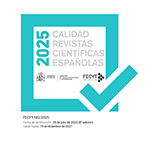Archeology and nationalism: The development of archeology in Catalonia (1907-1936)
Abstract
After the Congress of Vienna in 1815, the European states began to use archaological research as a way to legitimize their political aspirations. In Catalonia, towards the end of the nineteenth century, the cultural movements of the Renaixença and Noucentisme called for a renaissance of Catalan culture that would underscore its distinctive nature visà- vis the Spanish state. This proposal was quickly followed by political demands for self-government and recognition of the Catalan language and its areas of influence. For instance, Enric Prat de la Riba, one of the main activists and ideologists of Catalan nationalism, used the results of the excavations of Empúries as the basis of his politics of difference. This paper explores the influence of nationalism on the organization of Catalan archaology through an analysis of the political discourses of the leaders of the Regionalist League of Catalonia (Lliga Regionalista de Catalunya) and the archives of the History and Archaology Section of the Institute of Catalan Studies (Institut d’Estudis Catalans).Downloads
Article download
License
In order to support the global exchange of knowledge, the journal Complutum is allowing unrestricted access to its content as from its publication in this electronic edition, and as such it is an open-access journal. The originals published in this journal are the property of the Complutense University of Madrid and any reproduction thereof in full or in part must cite the source. All content is distributed under a Creative Commons Attribution 4.0 use and distribution licence (CC BY 4.0). This circumstance must be expressly stated in these terms where necessary. You can view the summary and the complete legal text of the licence.










